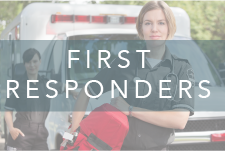Getting PTSD & Trauma Treatment for First Responders
- Nov 4, 2020
- 7 min read
Updated: Oct 16, 2025

For first responders, the daily stress and trauma of the job can take a serious toll on mental health. It’s a complex issue, often overlooked due to social stigmas. We have the information you need to understand this challenge and the resources available to help.
What is the best way for a first responder to start the process of getting help for trauma or PTSD?
The best way to start is by simply talking about your thoughts with family or colleagues. This helps normalize the conversation and can be a crucial first step toward finding the right treatment.
There is so much more to learn about the unique mental health struggles that first responders face and how specialized treatment can make a significant difference. Keep reading to discover valuable insights and practical steps for finding the right support.
Why Is Mental Health Support for First Responders So Critical?
The daily lives of first responders are filled with any number of stresses and dangers. Living with the threat of bodily harm to oneself and others takes a toll on the mental health of those who are tasked with putting their safety second when it comes to saving lives.
However, due to societal stigmas, the complicated and serious nature of first responders who suffer from trauma or post-traumatic stress disorder (PTSD) often goes overlooked, and it can be very difficult for those who face trauma every day to get the support they need to work through its difficulties.
The presence of trauma and PTSD symptoms permeate through a large number of first responders, and addressing the issue of their mental health begins with understanding that no first responder is alone in their trauma. There are several options available for first responders suffering from trauma, as well as treatment centers that cater to first responders who suffer from PTSD.
Normalizing Getting PTSD & Trauma Treatment for First Responders Dealing with Trauma
There are many reasons why first responders who suffer from trauma or PTSD may not reach out to treatment centers or professionals, even if they are aware they may benefit from it. Social stigmas surrounding words like “therapy” often exist in stark contrast to the image that many people hold of first responders.
These are people who are bastions of strength and protection, whose dedication to their communities and others is championed. However, this image doesn’t change the fact that first responders are on the front lines of traumatic events every day.
Whether someone is responding to a natural disaster or a domestic abuse call, the images that may stick in the minds of first responders can be harrowing. First responders are heroes, but also people, and need a chance to be able to let down their guard and experience their difficulties without feeling like they are compromising their image of strength, hope, or protection.
Finding the right treatment center for first responders who suffer from PTSD or trauma isn’t something that has to be done alone. Reaching out for help for trauma and PTSD symptoms doesn’t have to involve someone making a critical decision on the spot.
Simply talking about one’s thoughts on the matter, whether it be with family or colleagues, can help normalize reaching out. While each first responder’s trauma may be unique, colleagues and coworkers who have been exposed to similar situations may be able to shed light on their experiences with coping. Normalizing talking about traumatic events can help connect people to the right kind of treatment for their situation.
Connecting with Families

Families of first responders can be the most understanding and helpful resources available as someone begins their search for treatment. Not only can they help someone separate their own identity as a person and a first responder by allowing them to let their guards down, but they can also help someone understand the signs of their trauma.
Having an understanding and objective viewpoint on one’s mental health can be the push that someone needs to begin reaching out to professionals if symptoms of trauma or PTSD become regular occurrences.
Families can help by being a part of the process and doing their research on qualified facilities and practices that may best benefit a first responder.
Their intimacy with the first responder can help create the larger picture of how trauma has affected the person’s daily life, as well as better inform the first responder of what level of treatment may be necessary to effectively begin the healing process.
Finding the Right Place to Take the First Step for Trauma or PTSD Treatment for First Responders
Deciding to reach out for help with one’s trauma or PTSD is a huge step. However, it can also be a hurdle. First responder PTSD treatment and first responder trauma are very unique and may require a specialized approach.
When looking at programs that may help someone suffering from PTSD or trauma, it is important to also look for programs that may be catered specifically to first responders. This can provide several advantages for someone as they continue to move through the healing process.
Finding a place that caters specifically towards first responders, such as Chateau Recovery, means that you will be with like-minded peers who share the experience of being a first responder and can understand the unique, occupation-specific trials that someone may have to overcome.
Why Are Specialized Treatment Programs So Beneficial for First Responders?
Being surrounded by people who share in this unique kind of trauma or PTSD can allow someone to see that they are never alone in their struggles. Seeing how universal this kind of trauma is for those in the field can continue to normalize discussions surrounding the need for mental health, trauma, and PTSD care for first responders.
It also allows the first responders to work closer with the professionals at any given facility. Clinicians who specialize in treating the trials of first responders may be used to seeing clients who are armed or have more experience processing the unique horrors that a client with a first responder background may have to discuss.
This level of expectation and comfort can put the first responder more at ease as they understand they are being taken seriously, as well as having their unique line of work and the dangers that trauma and PTSD present to someone in the line of duty factored into treatment.
Set a Timeline for Yourself
Taking the first step is huge, but addressing the topics of PTSD treatment for first responders and first responder trauma takes a long time. Not only is it possible that someone is experiencing new traumatic events while going through their healing, but it is also possible they will have to deconstruct many mental walls around them, depending on how long they felt they had to keep up the image of unyielding strength.
Getting treatment involves setting oneself up for success in the present, as well as laying out a plan for the future. Specialized first responder programs can allow someone to explore their immediate stabilization through daily practices and grounding techniques that are unique and pertinent to one’s specific line of work while instilling a holistic, trauma-focused processing plan.
Identifying the problems and addressing specific stressful and traumatizing events is the first part of treatment, and facilities with specialized programs geared towards first responders are typically more knowledgeable about more targeted aftercare programs, as well as various strategies designed to be effective for one’s continued care.
Frequently Ask Questions:
• Why might a first responder hesitate to seek mental health treatment?
A first responder may not seek treatment because of social stigmas surrounding therapy, which can conflict with the public image of them as strong, protective figures.
• How can a first responder's family help them with their mental health?
Families can help by providing an objective viewpoint on the first responder’s mental health, assisting with research on treatment facilities, and creating a supportive environment where they can let their guard down.
• What is a key advantage of choosing a treatment center that caters specifically to first responders?
A key advantage is being with like-minded peers who share similar experiences, which helps them realize they are not alone in their struggles and normalizes discussions about mental health care.
• Why is a specialized approach necessary for treating first responder trauma?
A specialized approach is necessary because first responder trauma is unique and may require clinicians who are more experienced in processing the specific types of harrowing events they encounter.
How long does the process of treating first responder trauma take?
Addressing first responder trauma and PTSD takes a long time, as it may involve deconstructing long-held mental walls and navigating ongoing traumatic events while in treatment.
At Chateau Health and Wellness, we understand the unique challenges that first responders face every day. Our specialized programs are designed to address trauma and PTSD in a supportive, empathetic environment where you are surrounded by peers who truly get it. We are committed to helping you on your healing journey, providing the resources and care you need to move forward. When you're ready to take the next step, please call us at (435) 222-5225. We are here to support you in a way that honors your service and sacrifice.

About The Author
Ben Pearson, LCSW - Clinical Director
With 19 years of experience, Ben Pearson specializes in adolescent and family therapy, de-escalation, and high-risk interventions. As a former Clinical Director of an intensive outpatient program, he played a key role in clinical interventions and group therapy. With 15+ years in wilderness treatment and over a decade as a clinician, Ben has helped countless individuals and families navigate mental health and recovery challenges.
Danny Warner, CEO of Chateau Health and Wellness
Brings a wealth of experience in business operations, strategic alliances, and turnaround management, with prior leadership roles at Mediconnect Global, Klever Marketing, and WO Investing, Inc. A graduate of Brigham Young University in Economics and History, Danny has a proven track record of delivering results across diverse industries. His most transformative role, however, was as a trail walker and counselor for troubled teens at the Anasazi Foundation, where he directly impacted young lives, a personal commitment to transformation that now drives his leadership at Chateau.
Austin Pederson, Executive Director of Chateau Health and Wellness
Brings over eight years of experience revolutionizing mental health and substance abuse treatment through compassionate care and innovative business strategies. Inspired by his own recovery journey, Austin has developed impactful programs tailored to individuals facing trauma and stress while fostering comprehensive support systems that prioritize holistic wellness. His empathetic leadership extends to educating and assisting families, ensuring lasting recovery for clients and their loved ones.









